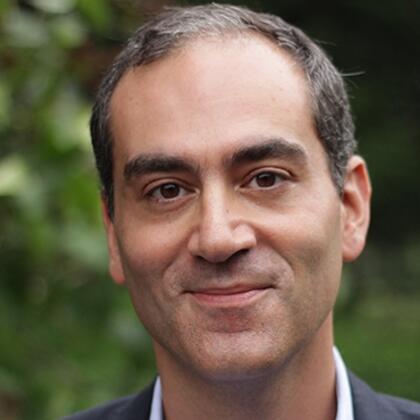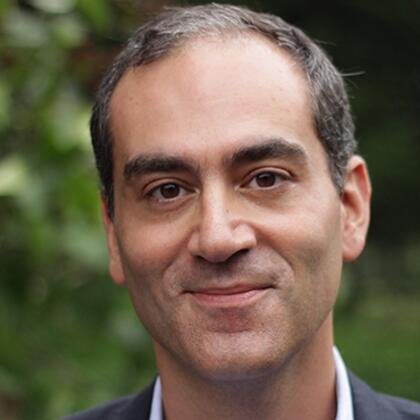Sleep and Mental Health
Share
- Details
- Text
- Audio
- Downloads
- Extra Reading
In recent years, the links between sleep and mental health have been slowly unravelled. We are beginning to understand that not only does mental health impact sleep, but also that poor sleep has important consequences on our psychology.
This lecture explores this complex relationship, and highlights the importance of sleep as a major factor in our mental wellbeing. The lecture covers strategies to manage disturbed sleep, and touches on other disorders such as nightmares and night eating syndrome.
Download Text
Sleep And Mental Health
Professor Guy Leschziner
13th March 2023
The experience of a bad night’s sleep, with the associated fatigue, cognitive symptoms and mood disturbance that ensues, is an almost universal human experience. That sleep is intimately linked to our psychological state, is borne out by our increased understanding of the functions of sleep, as well as our personal experience. Sleep is important for our emotional regulation, the perception of pain, and our emotional interpretation of neutral stimuli, amongst a myriad of other neurobiological and physiological functions.
This association is well-recognised in the world of psychiatry1. While sleep problems and mental health disorders are both very common, the co-occurrence of these issues is much higher than by chance alone. Mental illness is found in about 15% of normal sleepers, but these rates are much higher in people with insomnia (40%) and profound sleepiness (hypersomnia) (46%)2.
What has been historically less well recognised, is the nature of that relationship between sleep and mental health. The established view has in the past been that sleep disturbance is a symptom or a consequence of psychiatric disorders, and that sleep problems are a secondary phenomenon, reflective of the underlying psychiatric diagnosis. However, in recent years, evidence has accrued to point to the relationship between sleep and mental health as being bi-directional, i.e., while sleep is disturbed by psychiatric illness, psychiatric disorders are also potentially triggered or exacerbated by sleep disturbance. For example, persistent sleep issues in childhood increase the risk of anxiety disorders in adulthood by 60%3.
In this lecture, I will outline what we know about the association between sleep and three major classes of psychiatric disorders, and go on to describe opportunities for intervention.
Sleep disturbance is considered a hallmark of depression, and indeed is one of the diagnostic criteria. In those individuals with a major depressive episode, over 90% have some form of sleep disturbance, most commonly insomnia, but also excessive sleepiness4. Studies have concluded that the sleep disturbance often precedes mood alterations, implying that the sleep disturbance is not simply a consequence of mood disturbance, but may be part of the underlying neurobiological basis of depression or my actually be a trigger of mood disturbance.
Other strands of evidence also point to this conclusion. Longitudinal studies suggest that insomnia is associated with an increased risk of subsequent depression. One large meta-analysis of over 150000 individuals showed that the presence of insomnia doubled the risk of developing depression5, while another suggested a three-fold risk6. This finding has also been replicated in children, with additional evidence to show that circadian rhythm may also be of significance; a delayed sleep phase (a delayed body clock, as is seen in night-owls) is a further risk factor for subsequent depression. 50% of people in remission for depression have ongoing sleep issues, while this is the case for 84% of people with ongoing depression7, suggesting that insomnia is not only a symptom, but may also be important in influencing recovery. Furthermore, the presence of insomnia has consistently been found to be an independent risk factor for suicidal ideation and suicide attempts8. A greater baseline disturbance of sleep predicts worse response to treatment.
These studies clearly demonstrate an association, but evidence that sleep disturbance worsens depression is strengthened by studies showing that the treatment of insomnia also results an improvement in depressive symptoms. Indeed, studies of cognitive behavioural therapy (CBT)-based interventions for insomnia in those without a clinical diagnosis of depression, including some randomized controlled trials, have demonstrated moderate reductions in depressive symptoms with these sleep-focused treatments. Additionally, treatment of insomnia has been shown to reduce the likelihood of a depressive episode over the next year at least. In populations with major depression, there are fewer studies, but these all point to similar conclusions. These have shown that CBT for insomnia (CBTi) trends towards going into remission from depression, and one study showed that antidepressants and sleep hygiene advice had similar effects of depression as CBTi and placebo9. Yet another study shows that CBTi and CBT specifically for depression caused similar reductions in depressive symptoms.
Overall, research points to the importance of treating sleep disturbance in depression early, in order to increase the likelihood of depression remission and to lower suicidal ideation. Evening preference should also be treated.
Interest in the role of sleep in schizophrenia initially stemmed from observations in clinical practice that sleep is an extremely common complaint in schizophrenia, and that improved sleep seems to reduce delusions. A further clinical features is that the breakdown of the normal circadian pattern of daytime wakefulness and night-time sleep is extremely prevalent in schizophrenia, with the development of an irregular sleep-wake circadian rhythm disorder.
In the general population, there is a clear association between sleep issues and psychosis. The presence of sleep problems doubles the odds of a psychotic experience, and insomnia correlates strongly with particular types of psychotic experience such as paranoia, hallucinations and thought disorganisation.
80% of patients with a first episode of psychosis report at least one sleep disorder10, with an average of three different types of sleep problems. Furthermore, in those individuals at high risk of psychosis, sleep difficulties and circadian rhythm abnormalities predict a poorer prognosis11.
Sleep interventions in the general population imply that treating sleep reduces paranoia and hallucinatory experiences, and that sleep deprivation increases paranoia, hallucinations and thought disorganization. In patients with psychosis, data is far more limited, but CBT-based approaches to improve sleep have also shown improvements in other psychiatric symptoms too.
In contrast to other psychiatric disorders, our understanding of the role of sleep in schizophrenia lags behind, but certainly, as with other psychiatric disorders, the nature of the relationship clear is not one of sleep being a symptom, but actually representing an opportunity for intervention.
Anxiety and Post-Traumatic Stress Disorder
The relationship between anxiety and sleep is very self-evident. At the core of anxiety is an exaggeration of perceived threat, with an associated level of vigilance, and physiological and psychological hyper-arousal. Similarly, insomnia represents a state of hypervigilance or hyperarousal. Indeed genetic studies suggest and extremely high overlap in the genetic influences for insomnia and anxiety. Approximately 75% of people with anxiety also report sleep disturbance.
Post-traumatic stress disorder (PTSD) also represents a hyperarousal state, with profound anxiety precipitated by environmental triggers, flashbacks, sleep disturbance and trauma-related nightmares. These nightmares often persist beyond the other symptoms of PTSD. Approximately 40% of PTSD sufferers have sleep initiation difficulties, 90% of issues with sleep maintenance and 50% have recurrent trauma-related nightmares.
That sleep should have an important role in anxiety and PTSD is perhaps explained by some strands of evidence from normal individuals. Sleep deprivation increases the expectation of a negative stimulus: in a fear-conditioning study, subjects were taught to associate certain faces with an electric shock, and sleep deprivation increase the expectancy of a shock12. Furthermore, impaired sleep, particularly rapid-eye movement (REM) sleep, is thought to play an important role in the extinction of fearful memories associated with daytime events, and REM sleep has been proposed as representing a form of overnight “therapy”13. A single night of sleep deprivation results in changes in brain activity similar to those seen in anxiety using functional magnetic resonance imaging.
In veterans, poor sleep prior or after a traumatic event is a strong predictor of the development of subsequent PTSD. Indeed, sleep interventions like CBTi can help treat PTSD symptoms, and conversely CBT for anxiety helps sleep, again supporting the view of a bi-directional relationship between sleep and mental health.
Other Examples
Several other sleep conditions that are fundamentally considered primarily neurological also exhibit clear associations with psychological status. These include the association between daytime stress and non-REM parasomnias, such as sleep-walking and confusional arousals, the role of anxiety and is treatment in sleep paralysis and associated hypnagogic hallucinations, night-eating syndrome/sleep-related eating disorder with anorexia nervosa and bulimia, and rarer dissociative disorders of sleep. Furthermore, clinical experience suggests a role for sleep in functional neurological disorder and non-epileptic seizure disorder.
Treatment of Sleep Disorders in Psychiatric Disorders
While there remains much further research to be undertaken, evidence points to the important of identifying sleep disorders and their treatment independent of psychiatric therapy in the management of these disorders.
While sleep hygiene remains a mainstay of management, it is insufficient for the vast majority of people as a treatment for chronic insomnia or other sleep complaints, particularly in the context of psychiatric disorders.
The gold standard treatment for insomnia remains CBTi, although other non-drug based options exist, and may be adjuncts. These include acceptance and commitment therapy, autogenic training, and more specific therapies such as dream rescripting therapy or lucid dreaming therapy.
Some medications used widely in the treatment of psychiatric disorders may cause sleep to deteriorate rather than improve, and a better understanding of the influences of psychiatric pharmacological agents on sleep is fundamental to the management of these conditions. Additional therapies for the anchoring of circadian rhythms such as appropriately-timed melatonin and light therapy should be considered.
Finally, other sleep disorders such as obstructive sleep apnoea and periodic limb movement disorder should be addressed.
Conclusions
While this area of research remains in its infancy, it is clear that sleep is fundamental to good mental health. Furthermore, sleep disturbance is not simply a symptom of psychiatric conditions, and represents a treatable symptom that has important implications for proper treatment of co-morbid psychiatric complaints. Proper identification of sleep complaints, and their treatment, is likely very important for the prevention of psychiatric disorders later on in life, for the remission of psychiatric conditions, and for the reduction of suicidal ideation and suicide attempts. The management of sleep issues should be an integral part of any psychiatric intervention and should be considered a primary rather than secondary objective.
© Professor Guy Leschziner 2023
References and Further Reading
1. Freeman, D., Sheaves, B., Waite, F., Harvey, A. G. & Harrison, P. J. Sleep disturbance and psychiatric disorders. Lancet Psychiatry 7, 628–637 (2020).
2. Ford, D. E. & Kamerow, D. B. Epidemiologic study of sleep disturbances and psychiatric disorders. An opportunity for prevention? JAMA 262, 1479–1484 (1989).
3. Gregory, A. M. et al. Prospective longitudinal associations between persistent sleep problems in childhood and anxiety and depression disorders in adulthood. J. Abnorm. Child Psychol. 33, 157–163 (2005).
4. Geoffroy, P. A. et al. Insomnia and hypersomnia in major depressive episode: Prevalence, sociodemographic characteristics and psychiatric comorbidity in a population-based study. J. Affect. Disord. 226, 132–141 (2018).
5. Li, L., Wu, C., Gan, Y., Qu, X. & Lu, Z. Insomnia and the risk of depression: a meta-analysis of prospective cohort studies. BMC Psychiatry 16, 375 (2016).
6. Hertenstein, E. et al. Insomnia as a predictor of mental disorders: A systematic review and meta-analysis. Sleep Med. Rev. 43, 96–105 (2019).
7. Schennach, R., Feige, B., Riemann, D., Heuser, J. & Voderholzer, U. Pre- to post-inpatient treatment of subjective sleep quality in 5,481 patients with mental disorders: A longitudinal analysis. J. Sleep Res. 28, e12842 (2019).
8. Bishop, T. M., Walsh, P. G., Ashrafioun, L., Lavigne, J. E. & Pigeon, W. R. Sleep, suicide behaviors, and the protective role of sleep medicine. Sleep Med. 66, 264–270 (2020).
9. Espie, C. A. et al. Effect of Digital Cognitive Behavioral Therapy for Insomnia on Health, Psychological Well-being, and Sleep-Related Quality of Life: A Randomized Clinical Trial. JAMA Psychiatry 76, 21–30 (2019).
10. Reeve, S., Sheaves, B. & Freeman, D. Sleep Disorders in Early Psychosis: Incidence, Severity, and Association With Clinical Symptoms. Schizophr. Bull. 45, 287–295 (2019).
11. Reeve, S. et al. Sleep duration and psychotic experiences in patients at risk of psychosis: A secondary analysis of the EDIE-2 trial. Schizophr. Res. 204, 326–333 (2019).
12. Zenses, A.-K., Lenaert, B., Peigneux, P., Beckers, T. & Boddez, Y. Sleep deprivation increases threat beliefs in human fear conditioning. J. Sleep Res. 29, e12873 (2020).
13. Walker, M. P. & van der Helm, E. Overnight therapy? The role of sleep in emotional brain processing. Psychol. Bull. 135, 731–748 (2009).
References and Further Reading
1. Freeman, D., Sheaves, B., Waite, F., Harvey, A. G. & Harrison, P. J. Sleep disturbance and psychiatric disorders. Lancet Psychiatry 7, 628–637 (2020).
2. Ford, D. E. & Kamerow, D. B. Epidemiologic study of sleep disturbances and psychiatric disorders. An opportunity for prevention? JAMA 262, 1479–1484 (1989).
3. Gregory, A. M. et al. Prospective longitudinal associations between persistent sleep problems in childhood and anxiety and depression disorders in adulthood. J. Abnorm. Child Psychol. 33, 157–163 (2005).
4. Geoffroy, P. A. et al. Insomnia and hypersomnia in major depressive episode: Prevalence, sociodemographic characteristics and psychiatric comorbidity in a population-based study. J. Affect. Disord. 226, 132–141 (2018).
5. Li, L., Wu, C., Gan, Y., Qu, X. & Lu, Z. Insomnia and the risk of depression: a meta-analysis of prospective cohort studies. BMC Psychiatry 16, 375 (2016).
6. Hertenstein, E. et al. Insomnia as a predictor of mental disorders: A systematic review and meta-analysis. Sleep Med. Rev. 43, 96–105 (2019).
7. Schennach, R., Feige, B., Riemann, D., Heuser, J. & Voderholzer, U. Pre- to post-inpatient treatment of subjective sleep quality in 5,481 patients with mental disorders: A longitudinal analysis. J. Sleep Res. 28, e12842 (2019).
8. Bishop, T. M., Walsh, P. G., Ashrafioun, L., Lavigne, J. E. & Pigeon, W. R. Sleep, suicide behaviors, and the protective role of sleep medicine. Sleep Med. 66, 264–270 (2020).
9. Espie, C. A. et al. Effect of Digital Cognitive Behavioral Therapy for Insomnia on Health, Psychological Well-being, and Sleep-Related Quality of Life: A Randomized Clinical Trial. JAMA Psychiatry 76, 21–30 (2019).
10. Reeve, S., Sheaves, B. & Freeman, D. Sleep Disorders in Early Psychosis: Incidence, Severity, and Association With Clinical Symptoms. Schizophr. Bull. 45, 287–295 (2019).
11. Reeve, S. et al. Sleep duration and psychotic experiences in patients at risk of psychosis: A secondary analysis of the EDIE-2 trial. Schizophr. Res. 204, 326–333 (2019).
12. Zenses, A.-K., Lenaert, B., Peigneux, P., Beckers, T. & Boddez, Y. Sleep deprivation increases threat beliefs in human fear conditioning. J. Sleep Res. 29, e12873 (2020).
13. Walker, M. P. & van der Helm, E. Overnight therapy? The role of sleep in emotional brain processing. Psychol. Bull. 135, 731–748 (2009).
Part of:
This event was on Mon, 13 Mar 2023
Support Gresham
Gresham College has offered an outstanding education to the public free of charge for over 400 years. Today, Gresham College plays an important role in fostering a love of learning and a greater understanding of ourselves and the world around us. Your donation will help to widen our reach and to broaden our audience, allowing more people to benefit from a high-quality education from some of the brightest minds.


 Login
Login







